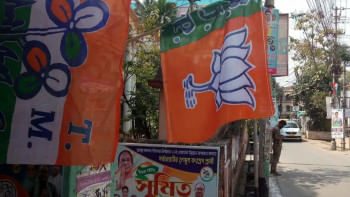Six in ten low-income households struggle to meet nutritional needs

Around 38 percent of low-income households in Bangladesh were food insecure in August as essential commodity prices only dropped slightly after the interim government took office on August 8, according to the World Food Programme (WFP).
A WFP study, styled "Rapid Market Monitor", found that food inflation declined in the second week of August.
It had reached an all-time high of 14.1 percent due to disruptions in the supply chain as business activities were hampered in July amid a mass uprising that culminated in the ousting of the Sheikh Hasina-led Awami League government on August 5.
Additionally, food security deteriorated in August compared to July as floods affected the southeastern, northeastern and coastal regions of the country.
Another WFP report, styled "Food Security and Livelihoods Monitoring", found that close to three in every 10 households could not afford an adequate diet in August.
The number rises to six in every 10 households when considering the low-income segment. This is because the price of essential commodities has remained relatively high.
For example, the price of coarse rice peaked at Tk 57 per kilogramme in the last week of July before dropping to Tk 52 in the second week of August.
Still, the price remains 13 percent higher year-on-year and therefore continues to erode consumers' purchasing power.
Prices of other commodities, including wheat flour, lentils, eggs and soybean oil, showed similar trends between late July and early August, the report said.
Although food inflation eased following the regime change, it remains at more than 10 percent.
The consumer price index, which measures the weighted average market price of certain goods, fell to 10.49 percent in August from 11.66 percent the month prior, according to the Bangladesh Bureau of Statistics.
Furthermore, in August, overall inflation hovered above 9 percent for the 18th month straight.
Micronutrient-rich food consumption remains low across all income groups, with a significant portion of households having diets that are low in iron and protein.
The WFP report shows that most vulnerable households continued to rely on coping strategies to deal with food security, with about seven in every 10 selling assets to make do.
Many households that faced food shortages were forced to either rely on credit purchases or spend from their savings, thereby reducing the scope for spending on other essential issues like healthcare.
So, the overall situation remains unchanged, it said.
The WFP report mentioned that female-headed households and those with disabilities suffered the most amid severe flooding in north-eastern Bangladesh.
The losses incurred during Cyclone Remal have put poor households in a struggle for food and their well-being, it added.
Cyclone Remal had a devastating impact on 20 districts, affecting almost four lakh people and causing damage worth over Tk 7,000 crore, according to the Ministry of Disaster Management and Relief.
The cyclone claimed 18 lives and injured 2,503 people while also impacting fisheries, roads, and housing.
The damage to the fisheries across affected areas amounts to about Tk 2,242 crore while damage to roads and housing was worth around Tk 1,012 crore and Tk 2,052 crore respectively.
Meanwhile, traders across major markets reported improved sales hours due to the lifting of curfews and the restoration of food supply chains as well as a decrease in transportation costs.
However, despite the extended trading hours, trading volumes have not yet returned to pre-curfew levels, likely due to reduced purchasing power among much of the population, it added.
MM Akash, a former professor of economics at the University of Dhaka, said food insecurity has risen in recent times due to various factors.
"Double-digit inflation has been prevailing in the country for a long time. As a result, real incomes have decreased.
The earning power of those from lower-income households has decreased so much as their food budget is being stretched, he said.
To solve this problem, the government allocation for subsidised food programmes such as the Open Market Sales and initiatives of the Trading Corporation of Bangladesh should be increased, he said.
He added that the list of beneficiaries should be scrutinised because the list made by the previous government was flawed as it was politically biased.
Otherwise, the number of new poor in the country will increase, he said.


 For all latest news, follow The Daily Star's Google News channel.
For all latest news, follow The Daily Star's Google News channel. 



Comments